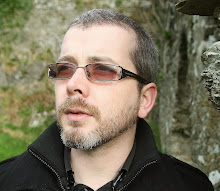Q1. What are you writing at the minute?
I’m working on some narrative non-fiction, which is the fancy name for a memoir. It’s a book about my experience of depression following the publication of my first novel, Fodder, how perfectionism can be both a constructive and destructive force, and how Cognitive Behavioural Therapy can help even the most tenacious of depressives.
Q2. Can you give us an idea of your typical up-to-the-armpits-in-ideas-and-time writing day?
I write even when I don’t have ideas, because bashing away at a keyboard seems to help ideas form. Writing time is different to normal time – it goes fantastically, disappointingly, quickly. I forget to eat, drink and sleep when I write. I’m in another world, and after a long period of writing time, I feel like I’ve been meditating.
Q3. What do you do when you’re not writing?
In my day job, I’m Creative Director at Belfast-based advertising agency Genesis. I come up with ideas for campaigns, develop scripts and oversee creative production. I also have an 8 year old daughter, who is made of starshine and diamonds, and in whose wake I stand transfixed.
Q4. Any advice for a greenhorn trying to break into the crime fiction scene?
I’m more a writer of contemporary fiction rather than crime fiction, but when it comes to breaking into anything, plain old-fashioned doggedness is the key. Hang in there. The more you write, the better you get, so believe in what you do, even if you don’t always believe in yourself.
Q5. Which crime writers have impressed you this year?
There is a superb novella called Down the Rabbit Hole by Juan Pablo Villalobos. It’s inspired by Mexican crime fiction, and is about a crime family, but it’s more literary fiction than crime fiction. The concept is so simple, the protagonist so genuine, and the prose so tight and controlled – it completely blew my socks off. I wish I’d written it.
Q6. What are you reading right now?
I’m reading a hilarious satire of Amercian entrepreneurship called Lightning Rods by Helen DeWitt. Ridiculous concept, but so warmly and skillfully written, it’s a joy to read.
Q7. Plans for the future?
Once I finish the memoir, my agent, New Yorker Paul Feldstein, whose agency is based in Northern Ireland, will find a publisher for it. Well, I hope he will! Paul is as dogged as I am, so I’m optimistic. After that, it will be a return to fiction.
Q8. With regards to your writing career to date, would you do anything differently?
God, yeah. I wouldn’t have burnt out after my first novel and lost five years to depression. But in a way, almost destroying myself is what it took to produce Fodder, so I can’t truly regret it. It’s not something I’d advise anyone to try though.
Q9. Do you fancy sharing your worst writing experience?
After Fodder was published, I was invited to appear at various festivals and events, all of which I really enjoyed – except one. I took part in a panel on a high profile London arts show, and was asked to decipher a poem by an Irish poet who was known for her indecipherable poetry. And she was sitting right beside me, in all her flowing, ethnic, Irish colleen, impenetrable glory. I’m a novelist, not a poet. I had no idea what it was about. So I waffled. And giggled. I made a face and looked like a dick. Then I melted into a puddle and poured myself into a bin. I developed a deep-seated fear of poets after that, but there was a silver lining – my resulting phobia was in the inspiration for Poets Are Eaten as a Delicacy in Japan.
Q10. Anything you want to say that I haven’t asked you about?
The Arts Council of Northern Ireland and, in particular, Damian Smyth, have been crucial to the development of my writing career, and not just in terms of financial support, although that has certainly played a part. Damian’s belief in the quality of my work gave me a real boost, when I needed it most. I thought I was crap. Damian put me right. Thanks, Damian.
Thank you, Tara West!
Wednesday, 4 September 2013
Subscribe to:
Post Comments (Atom)





No comments:
Post a Comment